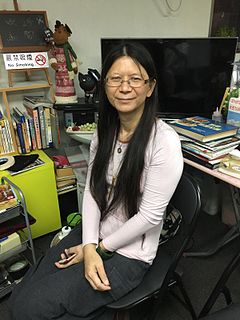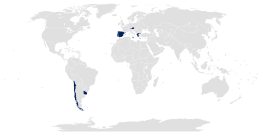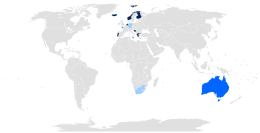
In law, sex characteristics refers to an attribute defined for the purposes of protecting individuals from discrimination due to their sexual features. The attribute of sex characteristics was first defined in national law in Malta, in 2015. The legal term has since been adopted by United Nations, European, and Asia-Pacific institutions, and in a 2017 update to the Yogyakarta Principles on the application of international human rights law in relation to sexual orientation, gender identity, gender expression and sex characteristics.

Intersex Human Rights Australia (IHRA) is a voluntary organisation for intersex people that promotes the human rights and bodily autonomy of intersex people in Australia, and provides education and information services. Established in 2009 and incorporated as a charitable company in 2010, it was formerly known as Organisation Intersex International Australia, or OII Australia. It is recognised as a Public Benevolent Institution.

The International Intersex Forum is an annual event organised, then later supported, by the ILGA and ILGA-Europe that and organisations from multiple regions of the world, and it is believed to be the first and only such intersex event.

Intersex people are born with sex characteristics, such as chromosomes, gonads, or genitals, that, according to the UN Office of the High Commissioner for Human Rights, "do not fit typical binary notions of male or female bodies."

Small Luk is the first intersex person to openly acknowledge her biological sex characteristics in Hong Kong. She was born with partial androgen insensitivity syndrome. Luk lived as a male for 36 years, and now lives as a woman. She founded the organization "Beyond Boundaries – Knowing and Concerns Intersex" in 2011, which is concerned with, and strives for, the rights of intersex people.

Intersex people are born with sex characteristics, such as chromosomes, gonads, or genitals that, according to the United Nations Office of the High Commissioner for Human Rights, "do not fit typical binary notions of male or female bodies".

Intersex people are born with sex characteristics, such as chromosomes, gonads, or genitals that, according to the UN Office of the High Commissioner for Human Rights, "do not fit typical binary notions of male or female bodies". "Because their bodies are seen as different, intersex children and adults are often stigmatized and subjected to multiple human rights violations".

Intersex people are born with sex characteristics that "do not fit the typical definitions for male or female bodies". They are substantially more likely to identify as lesbian, gay, bisexual, or transgender (LGBT) than the non-intersex population, with an estimated 52% identifying as non-heterosexual and 8.5% to 20% experiencing gender dysphoria. Although many intersex people are heterosexual and cisgender, this overlap and "shared experiences of harm arising from dominant societal sex and gender norms" has led to intersex people often being included under the LGBT umbrella, with the acronym sometimes expanded to LGBTI. However, some intersex activists and organisations have criticised this inclusion as distracting from intersex-specific issues such as involuntary medical interventions.

The following is a timeline of intersex history.

Intersex rights in New Zealand are protections and rights afforded to intersex people. Protection from discrimination is implied by the Human Rights Act and the Bill of Rights Act, but remains untested. The New Zealand Human Rights Commission states that there has seemingly been a "lack of political will to address issues involved in current practices of genital normalisation on intersex children".

Intersex rights in Australia are protections and rights afforded to intersex people through statutes, regulations, and international human rights treaties, including through the Sex Discrimination Act 1984 (Cth) which makes it unlawful to discriminate against a person based upon that person's intersex status in contexts such as work, education, provision of services, and accommodation.

Intersex people in the United States have some of the same rights as other people, but with significant gaps, particularly in protection from non-consensual cosmetic medical interventions and violence, and protection from discrimination. Actions by intersex civil society organizations aim to eliminate harmful practices, promote social acceptance, and equality. In recent years, intersex activists have also secured some forms of legal recognition. Since April 11, 2022 US Passports give the sex/gender options of male, female and X by self determination.

The Malta declaration is the statement of the Third International Intersex Forum, which took place in Valletta, Malta, in 2013. The event was supported by the ILGA and ILGA-Europe and brought together 34 people representing 30 organisations from multiple regions of the world.

Intersex people in Germany have legal recognition of their rights to physical integrity and bodily autonomy, with exceptions, but no specific protections from discrimination on the basis of sex characteristics. In response to an inquiry by the German Ethics Council in 2012, the government passed legislation in 2013 designed to classify some intersex infants to a de facto third category. The legislation has been criticized by civil society and human rights organizations as misguided.

Intersex people in the United Kingdom face significant gaps in legal protections, particularly in protection from non-consensual medical interventions, and protection from discrimination. Actions by intersex civil society organisations aim to eliminate unnecessary medical interventions and harmful practices, promote social acceptance, and equality in line with Council of Europe and United Nations demands. Intersex civil society organisations campaign for greater social acceptance, understanding of issues of bodily autonomy, and recognition of the human rights of intersex people.

Intersex people are born with sex characteristics, such as chromosomes, gonads, hormones, or genitals that, according to the UN Office of the High Commissioner for Human Rights, "do not fit the typical definitions for male or female bodies". Such variations may involve genital ambiguity, and combinations of chromosomal genotype and sexual phenotype other than XY-male and XX-female.

Intersex people in Argentina have no recognition of their rights to physical integrity and bodily autonomy, and no specific protections from discrimination on the basis of sex characteristics. Cases also exist of children being denied access to birth certificates without their parents consenting to medical interventions. The National Institute Against Discrimination, Xenophobia and Racism and civil society organizations such as Justicia Intersex have called for the prohibition of unnecessary medical interventions and access to redress.

Intersex people in Switzerland have no recognition of rights to physical integrity and bodily autonomy, and no specific protections from discrimination on the basis of sex characteristics. In 2012, the Swiss National Advisory Commission on Biomedical Ethics published a report on the medical management of differences of sex development or intersex variations.

Intersex people in Taiwan currently face some gaps in legal protection of their rights to physical integrity and bodily autonomy, and in protection from discrimination on the basis of sex characteristics, with significant improvements in recent years.














